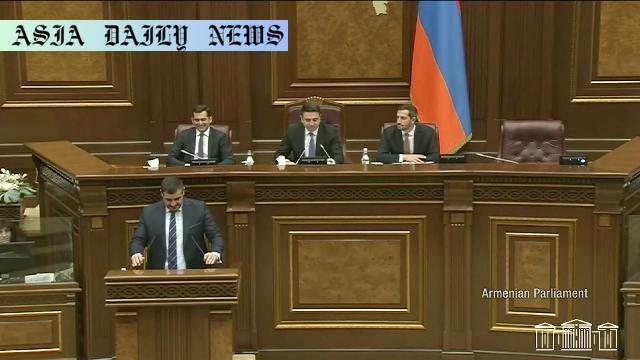Armenia EU Membership: Armenia’s parliament approves a bill to launch talks on joining EU, signaling a geopolitical shift from Russia.

Armenia’s Bold Step Towards EU Membership
In a significant geopolitical evolution, Armenia’s parliament has approved a bill that initiates negotiations for membership in the European Union. This pivotal decision, reported by Armenia’s state-run media, signifies a move away from Armenia’s long-standing alignment with Russia. Prime Minister Nikol Pashinyan has emphasized that the ultimate decision on EU membership will rest in the hands of the Armenian people through a referendum.
Armenia’s historic ties to Russia, particularly as a member of the Russia-led Eurasian Economic Union and the Collective Security Treaty Organization (CSTO), make this decision both bold and contentious. Russia has voiced its dissatisfaction with this development, with reports from Russian state media indicating that Armenia’s potential EU membership is incompatible with its obligations in these alliances. This friction between the two nations has profound implications, not only for Armenia’s domestic politics but also for broader regional stability.
Geopolitical Tensions Amid Armenia’s Strategic Shift
Armenia’s inclination toward Europe comes at a time of heightened tension with Russia. The backdrop of this decision includes Armenia’s recent conflicts with Azerbaijan over the disputed Nagorno-Karabakh region. In 2023, following military defeats in the region, Armenia accused Russia of failing to uphold its security obligations under CSTO agreements. This criticism is a driving force behind Armenia’s push to reevaluate its alliances and explore alternatives, such as closer ties to the European Union.
For Russia, Armenia’s engagement with Europe could undercut its influence in the Caucasus region. At the same time, for Armenia and its leadership, the drifting away from Russian dominance represents both an act of sovereignty and a calculated risk. Yet, the question remains: Can Armenia successfully navigate the complexities of EU membership while managing the inevitable friction with its traditional ally?
The Road Ahead: Challenges and Opportunities for Armenia
Joining the European Union would be a lengthy and challenging process for Armenia, requiring significant reforms across economic, political, and legal domains. The potential benefits, however, are substantial. EU membership would likely bring financial aid, improved trade opportunities, and strengthened democratic institutions. For ordinary Armenians, this step would represent an aspiration toward security and prosperity aligned with European standards.
However, the journey is fraught with obstacles. Armenia will face opposition at home from pro-Russian factions and abroad from Russia itself. The need for a domestic referendum adds another layer of uncertainty. Additionally, the memories of recent conflicts in Nagorno-Karabakh and the challenges of maintaining peace in the region necessitate delicate diplomacy. Armenia’s leaders will be tasked with balancing these domestic pressures against the backdrop of transformative international aspirations.
Commentary
Armenia’s Historic Shift: A Commentary
Armenia’s decision to initiate talks on joining the European Union represents a profound and courageous geopolitical shift. For a nation long tethered to Moscow’s orbit, this step symbolizes a turning point that aligns with aspirations for greater sovereignty, democracy, and integration with Europe. Yet, it also places Armenia at a crossroads, where the potential for progress intersects with palpable risks and challenges.
The rift between Armenia and Russia has widened since the Nagorno-Karabakh conflict. Armenia’s perception that Russia failed to meet its security obligations under the CSTO has likely fueled a sense of disenchantment with the Kremlin. By moving towards Europe, Armenia appears to be charting a new path, one rooted in aligning its future with democratic principles and economic opportunities associated with the EU.
There is no denying that Armenia’s pivot to Europe will be met with resistance. Russian influence in the region remains substantial, and any such move challenges Moscow’s dominance in the Caucasus. The strained relationship between the two countries might have diplomatic consequences that Armenia will need to navigate cautiously. Nonetheless, Prime Minister Nikol Pashinyan’s decision to put EU membership to a referendum reflects a commitment to democratic processes.
For Armenia, the journey ahead is as challenging as it is inspiring. The adoption of EU standards, compliance with economic reform, and resolution of regional conflicts will be formidable tasks. Yet, if successful, Armenia has the opportunity to redefine its identity on the global stage, becoming a beacon of hope and democracy in a region fraught with uncertainty. The world will undoubtedly watch their progress with great anticipation.


